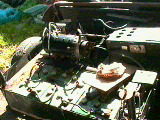 ... serial number SH007. Star Hawk was the name given to the car
by Jim Trevort and friends who built it for me in Sebring Florida.
... serial number SH007. Star Hawk was the name given to the car
by Jim Trevort and friends who built it for me in Sebring Florida.
Copyright © 1996 Malcom B. Strandberg Cambridge MA USA. All rights reserved.

 Delaine and I have owned an electric car (pictured) for over 10 years.
Most of the problems we have run into are related to perception that
the electric car has to be treated (driven, maintained, fueled, registered) the same as the gas car.
Delaine and I have owned an electric car (pictured) for over 10 years.
Most of the problems we have run into are related to perception that
the electric car has to be treated (driven, maintained, fueled, registered) the same as the gas car.
This means it should be typically considered as a second car. Which should be a big enough market. And in fact due to its potential lower costs should increase the already large number of households that own more than one car. (There are 190 million registered vehicles for the 168 million licensed drivers). Of course it could be the only car for the increasing number of people who vacation to places by taking a plane, train, or rental car.
I also realize that many American car owners want a car that will take them anywhere they want to go, even though most of the time is spent idling in a traffic jam. (Less than 5% of all car trips are for vacation or pleasure drives.) Look at the large number of jeep-like cars it our cities. These people will not be happy with an electric car, and lets not try to design one for them!
However some designers use this argument to promote the Hybrid car (gas + electric). At first I was against this as it went against the clean design of the electric car. But I have since felt that parallel hybrids (where you can turn off one part) do have a good market too, and that the hybrid commuters would come to find that they are rarely using the gas engine, and next time may buy the lower cost pure electric.
But we should not target the electric car for all day or long distance or off-road driving.
 ... the back of my car
(the rear cover removed)... This photo shows the new belt drive motor mount done by Bill Darby.
You can also see the batteries and charger which takes a standard grounded extension cord.
... the back of my car
(the rear cover removed)... This photo shows the new belt drive motor mount done by Bill Darby.
You can also see the batteries and charger which takes a standard grounded extension cord.
One of the statements that often comes up when discussing widespread use of electric cars is, "How are we going to get service stations to have charging 'pumps'?" and "How are we going to get the recharging time down to a few minutes?"
It is not that complicated! Gas cars need gas pump stations because you don't have a gas pump at home or at work. Gas cars need to be filled quickly because you are en route, and are not safely done unattended.
But electric cars can be charged at home or at work! And chargers will reliably turn off when the batteries are charged so it does not have to happen quickly while you stand around.
An electric car used for shopping/errands (which accounts for 60% of all car trips, and average 10 miles) can easily be accommodated by one charge from home. The typical commute (which accounts for 35% of all car trips and average under 20 miles) would benefit from an additional charge while at work.
Electric cars homebuilt or from the few electric car companies, have been charging just fine with regular electric outlets.
So the answer is that you don't need Electric Pump Stations.
But the Big Three think i am wrong!?
I guess these Gas Car companies now making electric cars have not been able to work out the above logic. By assuming we are going to need electric charging stations they have come up with special proprietary outlets for their cars that work only with these pumps. GM has an inductive outlet that only works with GM. Ford and Chrysler have a special safety outlet that is unlike outlets you may currently have at home or at work.
The upshot is, if you buy one of these cars, you either have to get your local service station to buy one of these charging pumps(silly) or get one for home(a waste of money).
Of course the Car companies claim some benefits for this. Because typical home and work outlets are only 15 - 20Amps, it will take up to 8 hours to charge your car. These chargers are installed on higher Amp circuits and therefore charge faster, 3 hours. They also claim that their outlet design is safer.
If we require these special outlets and you run out of juice in front of an outlet (i.e. any business or house), you won't be able to get charged. Businesses are going to complain about putting in outlets for electric cars if they have to buy these expensive units, and which do they install GM or Ford?
GM does have a regular outlet "for emergency use only" in their car. They obviously designed this to be inferior charger ( it takes 15 hours to recharge fully) to push customers into buying the proprietary charger! Even so, it is unlikely anyone will need to fully recharge this car as it has a 90 mile range.
I hope GM's car does succeed; I am just afraid that misspent design efforts on the charger will have a negative IMPACT.
 My car's dash only instruments are a few meters for monitoring voltage and current.
Not shown, I use a bicycle speedometer for speed and distance.
My car's dash only instruments are a few meters for monitoring voltage and current.
Not shown, I use a bicycle speedometer for speed and distance.
When I tell someone that my car has a range of 15 miles, I agree that it is pretty restricted. But even when I tell them that some electric cars have a range of 90 miles, they still feel that is restrictive.
On the other hand if I tell the same people that my brother commutes 50 miles (100 round trip), they find it excessive!
 If we can get peoples perceptions off of the gas car model, the electric
car is fairly simple.
If we can get peoples perceptions off of the gas car model, the electric
car is fairly simple.
When the first cars came out, the Electric car was preferred over the Gas car, until the electric starter for the gas car was designed. I guess if you consider the starter and battery, all gas cars today are electric hybrids. We just need to broaden the offerings to include a bigger electric system and a smaller gas system.
Until the recent legislation GM,Ford,Chrysler had a lack of interest in the electric car. And this is probably due to the electric car's low overall revenue (having a lower cost, less maintenance, and smaller sales volume). But this is unfortunate as the electric car will become popular worldwide (in a specific niche but sizable having similar appeal as the Honda civic and ford escort). And it would be nice for America to produce a new innovative automobile, and have the foreign markets try to keep up. The following quote is the last line from Taking Charge:
The main question mark that remains is which companies - the Detroit Three, today's US makers of electrics, or foreign firms - will be the big winners in the marketplace. Regardless of the corporate winners and losers, ordinary Americans will as last be buying, in more than token numbers, a vehicle that has been for nearly a century the car of the future.
Taking Charge: The electric automobile in America by Michael Brian Schiffer, Tamara C. Butts, Kimberly K. Grimm - published by Smithsonian Institution Press in 1994
 ... serial number SH007. Star Hawk was the name given to the car
by Jim Trevort and friends who built it for me in Sebring Florida.
... serial number SH007. Star Hawk was the name given to the car
by Jim Trevort and friends who built it for me in Sebring Florida.